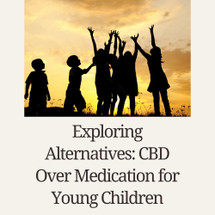Posted by Kayla Moon on Apr 22nd 2024
CBD Over Medication for Young Children

In the realm of pediatric care, especially concerning ADHD, the quick prescription of medication remains a contentious topic. Parents often find themselves navigating the muddy waters of pharmaceutical treatments, fearing the potential side effects these drugs could have on their children's development and personality.
One of the most concerning side effects observed is the so-called "zombie effect," where children seem dazed or exhibit a kind of hyper-focus that indicates their dosage might be too high. Additionally, changes in personality and other side effects have been noted, sparking a debate about the long-term implications of these medications.
Given these concerns, it's no wonder that many are seeking alternative treatments that promise fewer side effects. CBD (Cannabidiol) has emerged as a compelling natural alternative, prompting discussions among parents and healthcare providers about its potential benefits over traditional medications.
Revisiting Research on ADHD Medication
While the immediate effects of ADHD medication can be observed, the long-term impacts remain uncertain. Rachel Klein, PhD, and her team conducted an extensive study that tracked over 100 school-aged children treated for ADHD into their adulthood. The findings suggested that individuals who took ADHD medication did not show any significant negative health effects compared to those who didn't, years down the line. Dr. Klein emphasized the importance of treating ADHD to avoid higher rates of school failure, conflicts, and dangerous behaviors but also acknowledged the difficulty in evaluating the long-term effects of these medications on the brain.
Despite these findings suggesting the safety of ADHD medications in the long term, the concerns about their immediate side effects and the unknowns about their impact on brain development persist. This uncertainty opens the door for alternatives like CBD which is viewed by some as a milder and more natural option.
The Case for CBD
CBD, derived from the cannabis or hemp plant, has gained attention for its potential health benefits without the psychoactive effects associated with THC.
Its use in children, particularly for conditions like ADHD, is still a subject of ongoing research and debate. However, anecdotal evidence and preliminary studies have shown promise in using CBD to manage symptoms associated with ADHD, including hyperactivity and difficulty maintaining focus.
Top CBD Products for Children with ADHD
Given the growing interest in CBD as an alternative treatment, here are three recommended products for children with ADHD:
- Full Spectrum Water Soluble Tincture: This fast-acting option can be easily mixed into any beverage, providing ease of use for parents and children alike. It's particularly beneficial for those seeking quick results.
- Broad Spectrum CBD Gummies: With zero THC, these gummies offer the benefits of cannabinoids without the psychoactive effects. They're ideal for children sensitive to medications, helping to nourish the endocannabinoid system without adverse effects.
- THCV & CBC Gummies: Although THCV might sound psychoactive, it isn't in low quantities. Combined with CBC, these gummies help boost focus while stabilizing mood, offering a two-pronged approach to managing ADHD symptoms. (We recommend starting anyone at at 1/2 gummy dose to determine tolerance)
Navigating the Future of Pediatric Care
The debate between traditional medication and natural supplements like CBD for treating conditions such as ADHD in children is far from settled. Each child's situation is unique, and what works for one may not work for another. However, the shift towards exploring and accepting alternative treatments signifies an important step in providing more personalized and considerate care for our children.
Parents contemplating CBD as an alternative should consult with healthcare professionals experienced in both traditional and alternative medicine. This ensures a balanced approach to choosing the most appropriate and effective treatment plan for their child.
In the quest for more gentle and natural treatments, CBD offers a beacon of hope. While more research is needed to fully understand its implications and benefits, the current trajectory points towards an increasingly inclusive approach to healthcare, where the wellness and preferences of the patient are at the forefront of decision-making.


